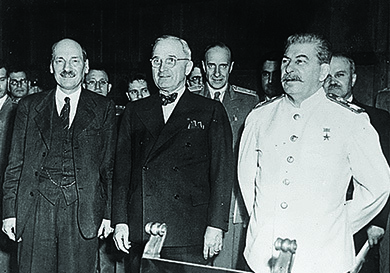| << Chapter < Page | Chapter >> Page > |
As World War II drew to a close, the alliance that had made the United States and the Soviet Union partners in their defeat of the Axis powers—Germany, Italy, and Japan—began to fall apart. Both sides realized that their visions for the future of Europe and the world were incompatible. Joseph Stalin, the premier of the Soviet Union, wished to retain hold of Eastern Europe and establish Communist, pro-Soviet governments there, in an effort to both expand Soviet influence and protect the Soviet Union from future invasions. He also sought to bring Communist revolution to Asia and to developing nations elsewhere in the world. The United States wanted to expand its influence as well by protecting or installing democratic governments throughout the world. It sought to combat the influence of the Soviet Union by forming alliances with Asian, African, and Latin American nations, and by helping these countries to establish or expand prosperous, free-market economies. The end of the war left the industrialized nations of Europe and Asia physically devastated and economically exhausted by years of invasion, battle, and bombardment. With Great Britain, France, Germany, Italy, Japan, and China reduced to shadows of their former selves, the United States and the Soviet Union emerged as the last two superpowers and quickly found themselves locked in a contest for military, economic, social, technological, and ideological supremacy.
The United States had a long history of avoiding foreign alliances that might require the commitment of its troops abroad. However, in accepting the realities of the post-World War II world, in which traditional powers like Great Britain or France were no longer strong enough to police the globe, the United States realized that it would have to make a permanent change in its foreign policy, shifting from relative isolation to active engagement.
On assuming the office of president upon the death of Franklin Roosevelt, Harry Truman was already troubled by Soviet actions in Europe. He disliked the concessions made by Roosevelt at Yalta, which had allowed the Soviet Union to install a Communist government in Poland. At the Potsdam conference, held from July 17 to August 2, 1945, Truman also opposed Stalin’s plans to demand large reparations from Germany. He feared the burden that this would impose on Germany might lead to another cycle of German rearmament and aggression—a fear based on that nation’s development after World War I ( [link] ).


Notification Switch
Would you like to follow the 'U.s. history' conversation and receive update notifications?